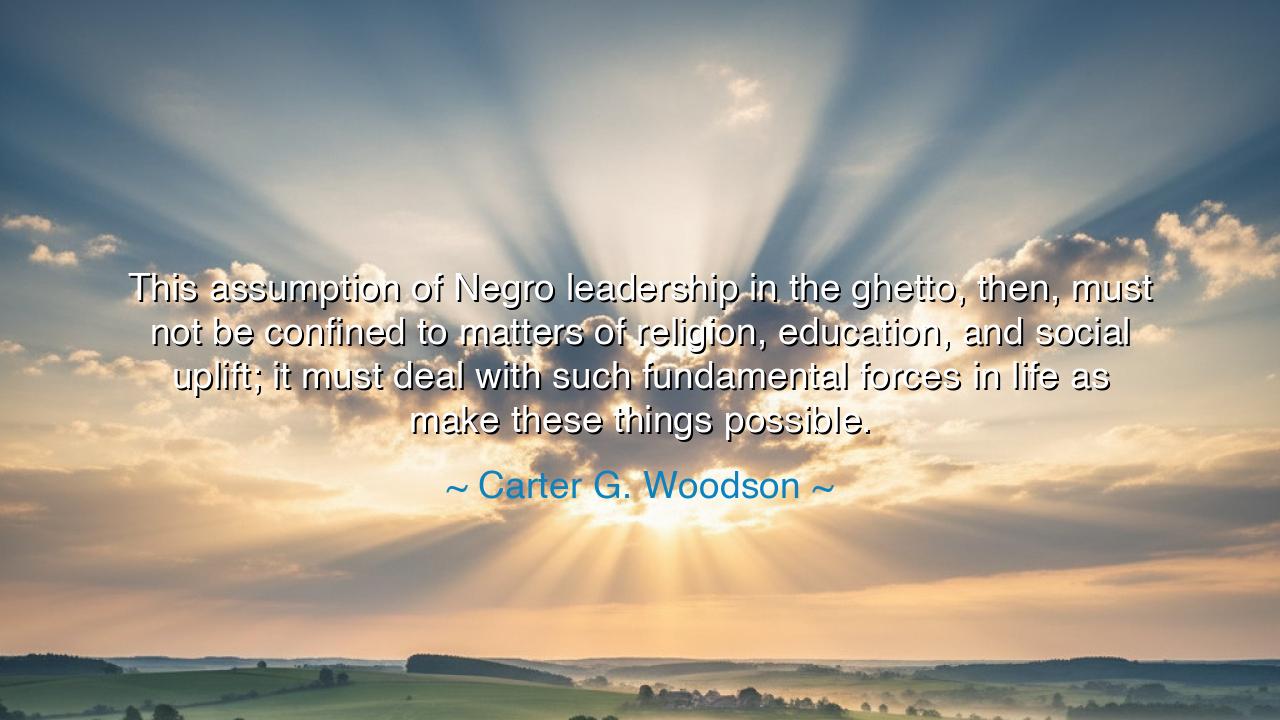
This assumption of Negro leadership in the ghetto, then, must not
This assumption of Negro leadership in the ghetto, then, must not be confined to matters of religion, education, and social uplift; it must deal with such fundamental forces in life as make these things possible.






Carter G. Woodson, the “Father of Black History,” declared with prophetic clarity: “This assumption of Negro leadership in the ghetto, then, must not be confined to matters of religion, education, and social uplift; it must deal with such fundamental forces in life as make these things possible.” These words, born of struggle and vision, speak to the heart of liberation. For Woodson knew that a people cannot rise merely by sermons, schools, or speeches, unless the deeper roots of power—economic strength, political agency, and control of their own destiny—are also grasped.
The meaning is profound. Too often, leadership in oppressed communities has been confined to noble but limited realms: the pulpit, the classroom, the charity hall. These are sacred and necessary, but alone they cannot overturn systems of poverty and injustice. Woodson reminds us that true leadership must reach into the soil itself—to the ownership of labor, to the building of wealth, to the control of institutions. Without these fundamental forces, religion becomes ritual without strength, education becomes preparation for servitude, and social uplift becomes a dream without foundation.
This wisdom comes from the soil of Woodson’s own life. Born to formerly enslaved parents, he knew the weight of poverty and the thirst for learning. He studied by lamp-light, labored in the coal mines, and through relentless effort rose to earn a doctorate from Harvard. Yet his vision was never narrow. He saw that Black Americans needed not only schools but ownership, not only sermons but economic independence, not only encouragement but structural change. Thus he founded Negro History Week, now Black History Month, to awaken pride and self-knowledge—but his cry was always for more: for a people to seize the fundamental forces of their own lives.
History confirms his vision. Consider the example of the Freedmen’s Bank, founded after the Civil War to hold the savings of newly freed slaves. Thousands trusted it, pouring their hard-won earnings into its vaults. Yet the bank was mismanaged by white officials and collapsed, destroying lives and generations of trust. What lesson does this tragedy reveal? That education and religion, though vital, are powerless without economic fundamental forces to sustain them. The people were told to uplift themselves, yet the structures of power denied them the tools. Woodson’s words are a cry against such half-measures: leadership must claim the foundation, not merely the decoration.
The civil rights movement, too, echoes this teaching. Martin Luther King Jr. is rightly remembered for his sermons on justice, but in his later years, he turned his fire to economics. In the Poor People’s Campaign, he declared that civil rights without economic rights was an incomplete victory. He knew, as Woodson knew, that the ghetto could not be transformed by spirit alone—it required bread, wages, homes, and control over one’s labor. His vision was cut short, but it testifies to the eternal truth: real leadership must grasp the fundamental forces of life.
The lesson for us is clear and urgent. Do not confine leadership to words, however beautiful, or to schools, however noble. Seek also to control the structures of power—land, industry, commerce, law. Build institutions owned and directed by the people themselves. Teach not only history, but also finance, entrepreneurship, and civic power. For only when a community governs the forces that sustain life can its religion, education, and uplift truly flourish.
So what must you do, child of the future? Support leaders who do more than inspire—support those who build. Do not be content with sermons that lift the heart; demand systems that feed the body. Create businesses in your community, teach your children the history of their people, and vote with the knowledge that laws shape lives. Remember that faith, schooling, and charity are precious, but they wither without the soil of economic strength, political influence, and cultural independence.
Thus, remember Woodson’s words: “This assumption of Negro leadership … must deal with such fundamental forces in life as make these things possible.” Let them be your compass. For only when a people grasp the roots of their power can they bear fruit that endures, rising not as beggars in another’s system, but as builders of their own destiny.






AAdministratorAdministrator
Welcome, honored guests. Please leave a comment, we will respond soon